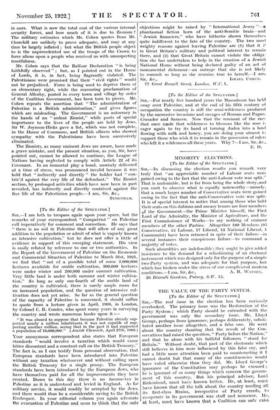MINORITY ELECTIONS.
[To the Editor of the SPECTATOR.]
Sia,—In discussing the election results you remark very truly that "an appreciable number of Labour seats were gained owing to the fact that the anti-Labour vote was split.'' That is undeniable, but is far from being the whole story, and you omit to observe what is equally noteworthy—namely, that a much larger number of Conservative seats were gained owing to the fact that the anti-Conservative vote was split- It is of special interest to notice that among those who hold their scats on this dubious and uneasy tenure are four member:4 of the Government—the Prime Minister himself, the First Lord of the Admiralty, the Minister of Agriculture, and the. First Commissioner of Works—to say nothing of eminent members of the other Parties. Altogether 180 Members (95 Conservative, 54 Labour, 17 Liberal, 13 National Liberal, 1 Communist) have been returned in spite of their failure—in several instances their conspicuous failure—to command a majority of votes.
Such absurdities arc indefensible.; they ought to give added insistence to the demand for a refashioning of an electoral instrument which was designed only for the purpose of a simple two-Party system, and was adequate for that purpose, but which has broken under the stress of our complicated modern conditions.—I am, Sir, &c., A. R. WTATSON. 36 Disraeli Gardens, Putney, S.W. 15.










































 Previous page
Previous page